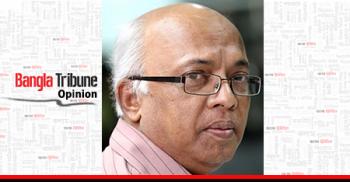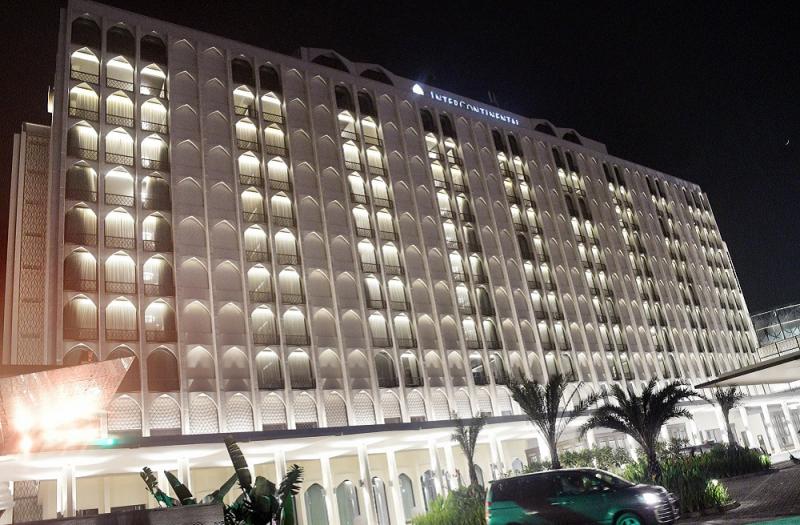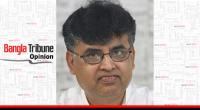 The return, for so it is, of Hotel InterContinental in the nation’s capital brings back a whole load of memories for the generation which passed from teenage to adulthood between the end of the 1960s and mid-1970s. The original InterContinental rose in what was largely a sleepy town in 1966, a time when Field Marshal Mohammad Ayub Khan lorded it over Pakistan. And, yes, we were part of Pakistan as its eastern province.
The return, for so it is, of Hotel InterContinental in the nation’s capital brings back a whole load of memories for the generation which passed from teenage to adulthood between the end of the 1960s and mid-1970s. The original InterContinental rose in what was largely a sleepy town in 1966, a time when Field Marshal Mohammad Ayub Khan lorded it over Pakistan. And, yes, we were part of Pakistan as its eastern province.
And that year 1966, if one recalls, was significant from the point of view of our national history. It was in February of the year that Bangabandhu Sheikh Mujibur Rahman, at the time general secretary of the East Pakistan Awami League (AL), made the very first public announcement of the Six Points in Lahore. And Lahore, incidentally, was one of the cities where the scheme of InterContinental hotels was placed in implementation.
The InterContinental in Dhaka began to assume political prominence when in late January 1971, Zulfikar Ali Bhutto, chairman of the Pakistan People’s Party (PPP), led a team of his advisors to the city to engage in negotiations with Bangabandhu and his Awami League team in the aftermath of the December 1970 general election. Bhutto and his team put up at the InterContinental, where some intense negotiations between the AL and the PPP went on for a few days. It was at these discussions that Bhutto floated the idea of a grand coalition between his minority party and the majority Awami League rather than the PPP sitting in opposition in the Pakistan National Assembly. The Awami League justifiably rejected the suggestion. Bhutto’s other proposal that the Awami League modify its Six Points was also dismissed out of hand by Bangabandhu and his colleagues.
Hotel InterContinental came into prominence again a couple of months later when Bhutto and his delegation arrived back in Dhaka on 21 March 1971 to join the negotiations that were already underway between Bangabandhu and President Yahya Khan at the President’s House opposite the Ramna Park. The junta leader had arrived in Dhaka on 15 March and was staying at the President’s House (which was later to be Ganobhaban and today houses the Foreign Service Academy). Bhutto’s team once again found accommodation at the InterContinental. A searing image from the times is one of Bengalis gathered outside the hotel shouting slogans against Bhutto and showing him their shoes every time he emerged from and went back to the hotel in the course of the talks going on at the President’s House. The reason for such crowd behaviour was obvious: Bhutto had already precipitated the crisis that was to lead Pakistan to disaster by refusing to attend the National Assembly session earlier scheduled for 3 March.
In the late hours of 25 March 1971, with Yahya Khan and his junta team having stealthily flown out to Karachi earlier in the evening, the Pakistan army launched its genocide, codenamed Operation Searchlight, all across Dhaka. One of its early targets was ‘The People’ newspaper, with its offices located behind the Sakura Restaurant. The newspaper was noted for its extremely critical articles on the role of the junta and the PPP. The soldiers set the offices of the newspaper on fire. Bhutto, who certainly had been aware of the army’s plan to launch operations against the population, watched the flames consuming the offices of The People from his suite at the InterContinental. Additionally, the InterContinental remains an important point in history for the fact that the hordes of foreign journalists descending on Dhaka in March 1971 to cover the political negotiations stayed in the hotel. All of them, except Simon Dring, were bundled out of the hotel minutes before the army launched its crackdown and flown out of Dhaka. Dring managed to escape the dragnet, hid in the kitchen and then went to the roof to watch Dhaka being torched by the Pakistan army. He was detected a day later and put on a flight to Bangkok, from where he filed the earliest dispatches by a foreign journalist on the genocide launched by the Pakistan army. Bhutto, meanwhile, was conducted by the army to safety from the InterContinental early on 26 March. At the Tejgaon airport, a PIA flight took him to Karachi, where on arrival he made the infamous statement, ‘Thank God, Pakistan has been saved.’
Additionally, the InterContinental remains an important point in history for the fact that the hordes of foreign journalists descending on Dhaka in March 1971 to cover the political negotiations stayed in the hotel. All of them, except Simon Dring, were bundled out of the hotel minutes before the army launched its crackdown and flown out of Dhaka. Dring managed to escape the dragnet, hid in the kitchen and then went to the roof to watch Dhaka being torched by the Pakistan army. He was detected a day later and put on a flight to Bangkok, from where he filed the earliest dispatches by a foreign journalist on the genocide launched by the Pakistan army. Bhutto, meanwhile, was conducted by the army to safety from the InterContinental early on 26 March. At the Tejgaon airport, a PIA flight took him to Karachi, where on arrival he made the infamous statement, ‘Thank God, Pakistan has been saved.’
The InterContinental was a target of the Mukti Bahini (liberation forces) during the War of Liberation. At one point, a crack platoon of Bengali guerrillas successfully caused explosions in the lobby of the hotel, which clearly was a sign of the Mukti Bahini operating well within the city of Dhaka. Obviously, the explosions generated understandable fear in the Pakistan army, which would soon begin to lose its morale.
The InterContinental was designated a Neutral Zone by the UN and the International Committee of the Red Cross (ICRC) towards the end of the war in December 1971. Non-Bengali civilian officers of the Pakistan government, who had been sent to Dhaka after the crackdown in March, and their families were provided safe sanctuary there and stayed there until they were transferred to India as prisoners of war. The InterContinental also housed Dr. AM Malek, the last governor of East Pakistan, and the ministers of his puppet government (which had been set up in September 1971) and their families until such time as they could be moved to prisons in what had by then emerged as the People’s Republic of Bangladesh.
Such is the history, political if you will, of Hotel InterContinental. When Prime Minister Sheikh Hasina inaugurated it anew on Thursday, she was also reopening the many doors to the history which has passed through them down the years.
Syed Badrul Ahsan is the editor-in-charge at The Asian Age
 Opinion
Opinion
30752 hour(s) 25 minute(s) ago ;
Morning 03:19 ; Saturday ; Apr 20, 2024
The InterContinental … and a bit of history
Send
Syed Badrul Ahsan
Published : 16:59, Sep 16, 2018 | Updated : 17:05, Sep 16, 2018
Published : 16:59, Sep 16, 2018 | Updated : 17:05, Sep 16, 2018
0 ...0 ...
/zmi/
***The opinions, beliefs and viewpoints expressed in this article are those of the author and do not reflect the opinions and views of Bangla Tribune.
- KOICA donates medical supplies to BSMMU
- 5 more flights to take back British nationals to London
- Covid19: Rajarbagh, Mohammadpur worst affected
- Momen joins UN solidarity song over COVID-19 combat
- Covid-19: OIC to hold special meeting
- WFP begins food distribution in Cox’s Bazar
- WFP begins food distribution in Cox’s Bazar
- 290 return home to Australia
- Third charter flight for US citizens to return home
- Dhaka proposes to postpone D8 Summit
Unauthorized use of news, image, information, etc published by Bangla Tribune is punishable by copyright law. Appropriate legal steps will be taken by the management against any person or body that infringes those laws.
Bangla Tribune is one of the most revered online newspapers in Bangladesh, due to its reputation of neutral coverage and incisive analysis.
F R Tower, 8/C Panthapath, Shukrabad, Dhaka-1207 | Phone: 58151324; 58151326, Fax: 58151329 | Mob: 01730794527, 01730794528


